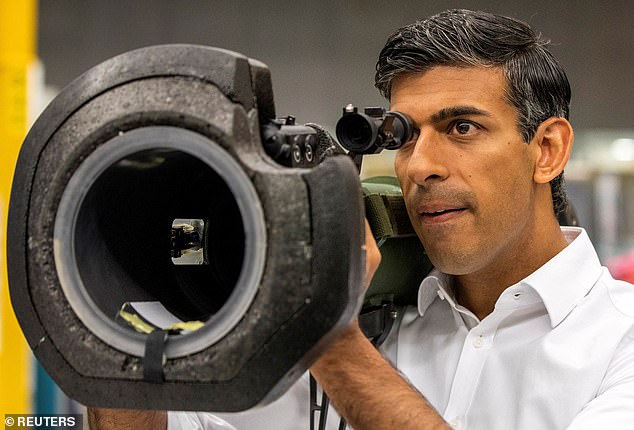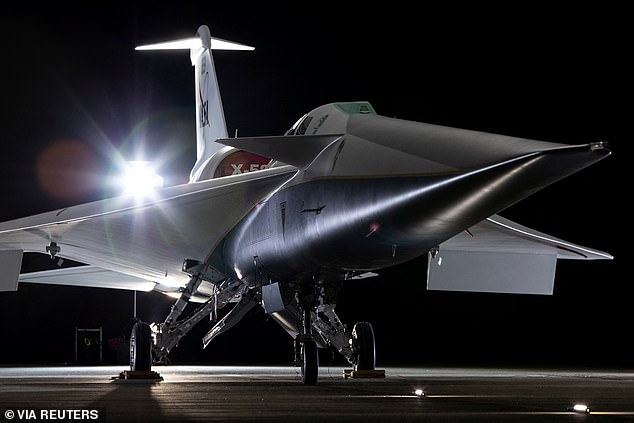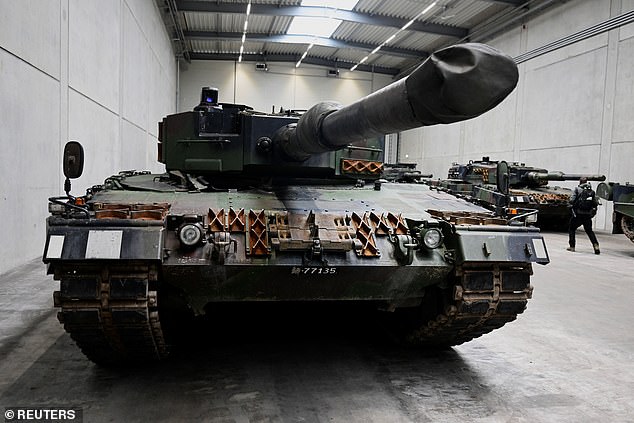At last, the Government has woken up to the threat posed by the axis of evil that is China, Iran, North Korea and Russia.
On Tuesday, after much brilliant campaigning by The Mail (Don’t Leave Britain Defenceless), Prime Minister Rishi Sunak stepped up to the plate and announced a major boost in the country’s defence spending.
It will mean that provided a future Prime Minister doesn’t put a spanner in the works (50:50), defence spending will rise from 2.3 per cent of the country’s GDP (Gross Domestic Product) to 2.5 per cent by the end of the decade.
‘It is a generational investment in British security and British prosperity, which makes us safer at home and stronger abroad,’ the Prime Minister said.
In cash terms, it will boost defence spending by £75billion – paid for in part by taking an axe to the country’s bloated army of stay-at-home civil servants (no tears there).

On Tuesday, Rishi Sunak stepped up to the plate and announced a major boost in the country’s defence spending
First and foremost, irrespective of political allegiances, we should all welcome this bold announcement from Rishi. As he said, it is imperative that we ‘defend our country, our interests and our values’.
Yet, from an investment point of view, what was interesting is that Rishi’s boost to defence spending was accompanied by a ‘joint statement’ from HM Treasury and the Investment Association – an organisation representing the country’s £8.8 trillion fund management industry.
Although brief, its message was clear: investing in defence companies is good for the country – and good for investors.
Ridiculous wokery issues – primarily based around funds having to be ESG (Environmental, Social and Governance) friendly – have resulted in many investment funds eschewing defence stocks. But the association (and Treasury) are now saying it is time for funds to row back.
‘Investing in good, high-quality, well-run defence companies is compatible with ESG considerations,’ the statement declared. ‘Long-term sustainable investment is about helping all sectors and all companies in the economy succeed.’ Hip, hip hooray.
In other words, if professional investors fail to provide quality defence businesses with the necessary capital to go about their work, we will make the country even more vulnerable to the threat posed by the axis of evil.
Or as Alec Cutler, a director of Orbis Investments, told me on Wednesday: ‘Peace through strength is at the base level of a society’s needs. Peace is a have-to-have, without which higher order desires relative to ESG will never achieve sustained traction.’ Absolutely.
So, how can private investors boost their pensions and Isas from this big increase in UK defence spending? It can be achieved in numerous ways – and not just by investing in this country’s big defence companies.
It’s a point that Jason Hollands, managing director of investment platform Bestinvest, is keen to point out. He says: ‘Rising UK defence spending is certainly good news for the country’s prestigious defence industry, creating jobs and, hopefully, providing a lift to the wider UK stock market.
‘Yet, rearmament across Europe and in the United States, plus the cross-border nature of many high-tech defence projects, means any investment approach should be global, not just UK based.’
Here are 10 opportunities that investors may wish to consider. They represent attractive long-term investment ideas, based on the opinion of a panel of investment experts.
Any share prices are correct at the time of writing.
FTSE100 STOCKS
1. BAE SYSTEMS

BAE Systems already has a bulging order book – £37.7billion of orders were received last year
BAE Systems is the country’s leading defence company. It’s an international brand, involved in the manufacture of the Eurofighter Typhoon, submarines, battle tanks, through to developing technology that can fend off cyber-attacks from rogue states.
It already has a bulging order book – £37.7billion of orders were received last year – and Rishi’s pledge to increase defence spending should keep this pipeline flowing.
Susannah Streeter, head of money and markets at investment platform Hargreaves Lansdown, says an added attraction is that more than 40 per cent of sales come from the United States. With the US also committed to increased defence spending, this should keep the company’s order book healthy.
‘From an investor point of view, BAE Systems is a difficult company to overlook,’ says Keith Bowman, equity analyst at wealth manager Interactive Investor. ‘With an attractive annual dividend of around 2.4 per cent, the City consensus is that its shares are a buy.’
Over the past year, the shares have risen nearly 35 per cent, compared to a 2 per cent increase in the FTSE100, the index of the country’s biggest companies.
Interactive says BAE is the 13th most bought UK stock so far this month.
2. ROLLS ROYCE

It’s not just cars. Rolls Royce also provides advanced power and propulsion systems for use in combat aircraft and submarines
Although Rolls Royce has big business interests in civil projects such as jet engines (the Trent XWB) and small modular nuclear reactors, it also provides advanced power and propulsion systems for use in combat aircraft and submarines.
Hargreaves’ Streeter says: ‘Under the new leadership of chief executive Tufan Erginbilic, productivity has improved, and company debts have been reduced. A multi-billion-pound order book points to strong future revenues – and with the promised swelling in the UK’s defence budget, it puts the company in an even better position.’
The business is back in profit (£2.4billion last year) and its transformation under Erginbilic has resulted in a rerating of the shares (up a staggering 170 per cent over the past year, 33 per cent over the past five).
Orbis’s Cutler is encouraged by Rolls Royce’s future stream of revenues from contracts such as supplying new engines for the United States’ fleet of B-52 aircraft – ‘valuable, non-cyclical cash flows’.
Dividends have yet to reappear after they were canned in the wake of the pandemic. Fidelity says that Rolls Royce was the fourth best-selling share on its investment platform in the first quarter of this year.
3. COMPASS

Compass, which provides numerous services to the country’s armed forces, could benefit if higher defence spending results in the recruitment of more forces personnel
Food contracting giant Compass provides numerous services to the country’s armed forces – from catering through to cleaning and the management of military facilities.
According to Hargreaves’ Streeter, Compass could benefit if higher defence spending results in the recruitment of more forces personnel – and ‘more hungry mouths to feed in bases across the UK and overseas’. As yet, there is no confirmation that the increase in defence spending will boost the number of armed forces personnel.
Over the past year, the shares are up 7 per cent. The dividends it pays shareholders are above where they were before the pandemic struck.
In the year to the end of September 2023, dividends totalled 43.1 pence a share. The shares currently trade at £22.33.
Compass has many strings to its bow beyond contracts with the military – which may comfort some investors.
FTSE250
4. CHEMRING

Chemring’s share price has risen by 27 per cent over the past year despite profits falling slightly in the year to the end of October 2023
Chemring provides technology products to the aerospace and defence industries.
Interactive’s Bowman says the company’s order book is in good shape, totalling £991million at the end of January – compared to £654 million a year earlier.
Its share price has risen by 27 per cent over the past year despite profits falling slightly in the year to the end of October 2023. The company pays shareholders a dividend equivalent to just below 1.9 per cent. The consensus view of City analysts is that its shares remain a ‘buy’.
Stuart Widdowson is manager of £190million investment trust Odyssean. He says all the key parts of Chemring’s business should ‘benefit’ from Rishi’s announcement last Tuesday: resulting in greater demand for products which protect aeroplanes and ships from heat-seeking missiles, through to cyber security systems.
5. & 6. OVERSEAS DEFENCE STOCKS

Attractive investments can be found in the United States and across Europe
David Coombs, multi-asset portfolio manager with Rathbone Asset Management, says investors should not necessarily confine themselves to UK defence stocks. Attractive investments, he says, can also be found in the United States and across Europe.
It’s a view shared by Orbis’s Cutler. ‘In Europe, especially, the long- term growth prospects for the defence industry have changed for the better. On defence spending, Europe needs to be at the vanguard, sitting in one of the world’s hottest geopolitical arenas.’
Coombs is a particular fan of defence stocks Thales (France) and Lockheed Martin (United States).
He says: ‘We’ve long owned aerospace and defence contractor Lockheed Martin to mitigate the risks of a more stressed geopolitical age. We have just increased our holding while adding Thales to our portfolios.’
Coombs likes the fact that both companies have adapted their businesses to cater for the changing needs of militaries – focusing, for example, on cybersecurity and digital warfare.
He adds: ‘Both now have comprehensive suites of cyber capabilities, supported by elements of Artificial Intelligence, machine learning and automation to deal with the complexities of today’s military deployments.’
International shares such as Lockheed Martin and Thales can be bought through mainstream investment platforms.
7. A THEMED INVESTMENT FUND

Hanetf Future of Defence can be bought through most investment platforms
For investors who want more diversified exposure, a small number of defence themed investment funds are now available. The best known is Hanetf Future of Defence which can be bought through most investment platforms.
The fund invests in 50 companies which generate revenues from defence spending by members of the North Atlantic Treaty Organisation (NATO) and NATO Plus countries (Australia, Israel, Japan, New Zealand, and South Korea).
Among its top 10 holdings are BAE Systems and Thales (both already mentioned), German defence systems supplier Rheinmetall and French aircraft equipment manufacturer Safran.
Tom Bailey, head of research, says: ‘There is a shift towards higher defence spending among European NATO members.
‘The key beneficiaries of this are big European defence firms such as Rheinmetall, BAE Systems and Leonardo, headquartered in Italian. All have massive order books.’
The fund’s annual charge is low at 0.49 per cent and its shares are traded on the London Stock Exchange (market ticker NATP).
Launched in July last year, it has assets of £266million. Over the past six months, it has produced a return of 29 per cent.
8. 9. and 10. DEFENCE-FRIENDLY INVESTMENT FUNDS
According to the Investment Association, investment funds currently have £35billion invested in defence stocks. Most of this exposure is through broadly invested UK or global funds.
Bestinvest’s Hollands says several funds have ‘sizeable’ exposure to defence and aerospace stocks. Such funds, he adds, could appeal to investors who want to profit from the expected defence boom, without necessarily putting all their eggs in one basket.
Investment fund Ninety One UK Special Situations has 8.9 per cent of its assets in Rolls Royce – its biggest holding – while stock market listed investment trust JPMorgan Claverhouse has both Rolls Royce and BAE Systems among its top 10 stocks.
The biggest holding in Law Debenture, a £1billion UK fund, is Rolls Royce at 4.9 per cent.
Over the past three years, the respective returns from the three funds are 35, 12 and 27 per cent.
All can be bought through major investment platforms.
Some links in this article may be affiliate links. If you click on them we may earn a small commission. That helps us fund This Is Money, and keep it free to use. We do not write articles to promote products. We do not allow any commercial relationship to affect our editorial independence.




